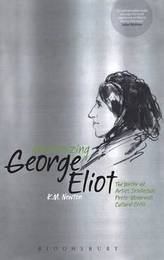
|
Modernizing George Eliot: The Writer as Artist, Intellectual, Proto-Modernist, Cultural Critic
Hardback
Main Details
| Title |
Modernizing George Eliot: The Writer as Artist, Intellectual, Proto-Modernist, Cultural Critic
|
| Authors and Contributors |
By (author) K.M. Newton
|
| Physical Properties |
| Format:Hardback | | Pages:240 | | Dimensions(mm): Height 234,Width 156 |
|
| Category/Genre | Literary studies - c 1800 to c 1900
Literary studies - fiction, novelists and prose writers |
|---|
| ISBN/Barcode |
9781849664943
|
| Classifications | Dewey:823.8 |
|---|
| Audience | | Tertiary Education (US: College) | | Professional & Vocational | |
|---|
|
Publishing Details |
| Publisher |
Bloomsbury Publishing PLC
|
| Imprint |
Bloomsbury Academic
|
| Publication Date |
8 December 2011 |
| Publication Country |
United Kingdom
|
Description
This book is available as open access through the Bloomsbury Open Access programme and is available on www.bloomsburycollections.com. George Eliot's work has been subject to a wide range of critical questioning, most of which relates her substantially to a Victorian context and intellectual framework. This book examines the ways in which her work anticipates significant aspects of writing in the twentieth and indeed twenty first century in regard to both art and philosophy. This new book presents a series of linked essays exploring Eliot's credentials as a radical thinker. Opening with her relationship to the Romantic tradition, Newton goes on to discuss her reading of Darwinism, her radical critique of Victorian values and her affiliation with the modernists. The final essays discuss her work in relation to Derridean themes and to Bernard Williams' concept of moral luck. What emerges is a very different Eliot from the conservative figure portrayed in much critical literature.
Author Biography
Ken Newton is Emeritus Professor of English at the University of Dundee. He is the author or editor of ten books, most recently Modern Literature and the Tragic (2009) and George Eliot, Judaism and the Novels (2002).
Reviews'K. M. Newton's Modernising George Eliot is a necessary, even urgent book. With style, wit, insight and forcefulness, Newton reads an Eliot for our times, as well as for her own. Demonstrating with panache, an acute eye for detail and historical significance, why Eliot should not be consigned to a literary heritage marked 'Victorian' (all those books we should read but never do), Newton's provocative and readable essays modernise George Eliot's novels in ways that should make all readers want to return to her publications, as if for a first time, with new eyes. An indispensable study, amongst the most significant on Eliot in the last fifty years, Modernising George Eliot should also modernise Eliot studies for quite some time to come'. * Julian Wolfreys, Professor of Modern Literature and Culture, Loughborough University * 'Modernizing George Eliot presents a George Eliot for our time, making a powerful case for her as a writer who anticipates modernism in her artistic sophistication and who is intellectually closer to Derrida than to Dickens in her understanding of the undecidable nature of political and ethical questions. Newton's readings of Daniel Deronda and Impressions of Theophrastus Such are particularly impressive in their attention to the subtlety of literary discourse and the complexity of George Eliot's thinking. A timely corrective to disparagement of her work on ideological grounds, these essays make an important contribution to our understanding of the novelist by demonstrating the radical nature of her intelligence.' * John Rignall, Reader in English and Comparative Literary Studies, University of Warwick * Newton is the first to argue that [Eliot's] intellectual and ethical concerns, as well as her formal experimentation, anticipated twentieth-century literary Modernism. Newton's Eliot emerges as a self-conscious innovator who was ahead of her time. This is a major contribution to our understanding of Eliot's place in literary and intellectual history. -- Nancy Henry, Professor of English, University of Tennessee - Knoxville, US Newton attacks [the views of Eliot critics] with vigour, pointing out that though Eliot's narrators have an air of omniscience about them, they are explicitly represented as interpreters rather than all-seeking, all-understanding consciousnesses. * Times Literary Supplement * [T]his volume's key and welcome accomplishment is to reverse the terms of much critical thinking in relation to George Eliot over the last thirty years. The author emerges not as the outmodedly conservative and conventional writer of twentieth-century critical construction, but as an intellectual and literary mammoth of proportions. -- Josie Billington, University of Liverpool * Modern Language Review * The first three chapters are rich and inventive explorations of the pre-Eliot period...The surprise of chapter 1 lies in its attention to details of layout and organization that made the Westminster Review competitive with other major quarterlies and improved on runs under earlier editors. -- Rosemarie Bodenheimer, Boston College * Victorian Studies Volume 56, No. 4 *
|